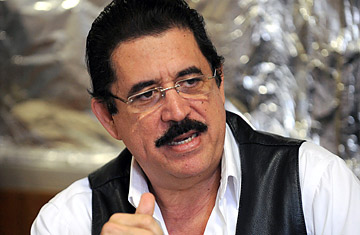
Toppled Honduran President Manuel Zelaya speaks during a meeting with advisers and negotiators inside the Brazilian embassy in Tegucigalpa on Oct. 12, 2009
(2 of 2)
The e-mail was not sent by the U.S. ambassador to the OAS, Lewis Amselem. But some of Amselem's recent public remarks are at odds with the Administration's stated support for restoring Zelaya. After Zelaya sneaked back into Honduras last month from an exile imposed by the military, Secretary of State Hillary Clinton said he and Micheletti now had "the best opportunity" to sign a deal brokered by Costa Rican President Oscar Arias that would reinstall Zelaya while granting amnesty to the coup leaders. But Amselem, a holdover from the George W. Bush Administration, called Zelaya's surprise reappearance in Tegucigalpa "irresponsible and foolish." Many diplomats say Micheletti took that as a green light to resist the accord and crack down on Zelaya supporters inside Honduras.
Either way, the State official says the long-term needs of Honduran democracy should also be weighed. Both sides have to "construct a national dialogue" that addresses "the political polarization plaguing Honduras in the first place," the official says, adding that the election "could end up providing new political leadership that finally confronts that problem." And to their credit, the leading presidential candidates — Porfirio Lobos of the National Party and Elvin Santos of the Liberal Party — have contributed responsibly to resolving the crisis.
But opponents of that reasoning say it risks undermining the entire U.S. stance against the coup and is unlikely to win any Latin-American backing. "Any election run by a coup government is automatically unconstitutional," Zelaya's Foreign Minister–in-exile, Patricia Rodas, insists. "You don't further democratization in Honduras by acquiescing to coup-mongers."
Mark Weisbrot, co-director of the Center for Economic and Policy Research, a liberal Washington think tank, says backing away from restoring Zelaya "sends an ugly signal that the U.S. doesn't really consider the era of using military coups in the region to be over." He adds it would fuel charges that Obama has been cowed by a small group of conservative Republican Cold Warriors in Congress. Led by South Carolina Senator Jim DeMint, they recently journeyed to Honduras to show their support for Micheletti and are holding up diplomatic appointments to protest Obama's opposition to the coup.
Zelaya, however, isn't always helping his own cause. After setting up in the Brazilian embassy last month, he claimed Israeli mercenaries were trying to zap him and his entourage with high-frequency radiation. Worse, David Romero, a director at Radio Globo, one of the shuttered pro-Zelaya stations in Honduras, spoke approvingly of Hitler's efforts to "finish off" the Jews, "because if there is anyone who is harmful to [Honduras], it's the Jews and the Israelites." Romero later apologized for the remarks, but they were an unsettling reminder of the Latin-American left's increasing tendency toward anti-Semitic rhetoric.
With that in mind, the State Department's reasoning is perhaps understandable: If Micheletti and Zelaya are the best leadership Honduras can offer right now, it's tempting to want to bless an election and move beyond the two of them as quickly as possible. But if Micheletti doesn't yield the presidency back to Zelaya by Nov. 29, whoever wins that day is likely to be a global pariah — a fact that perhaps the U.S. needs to come to terms with.
